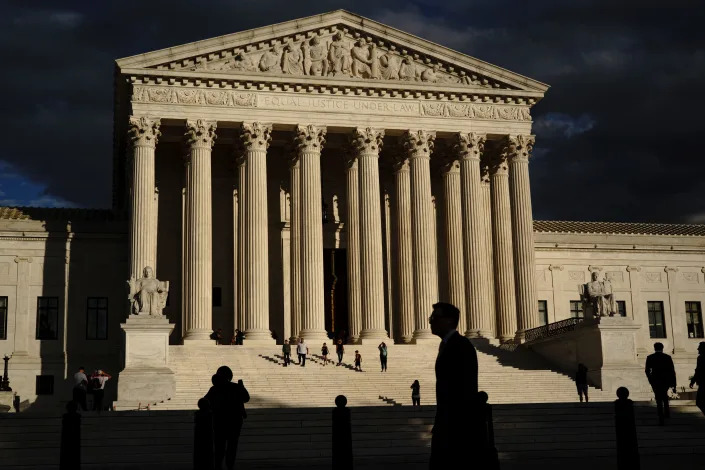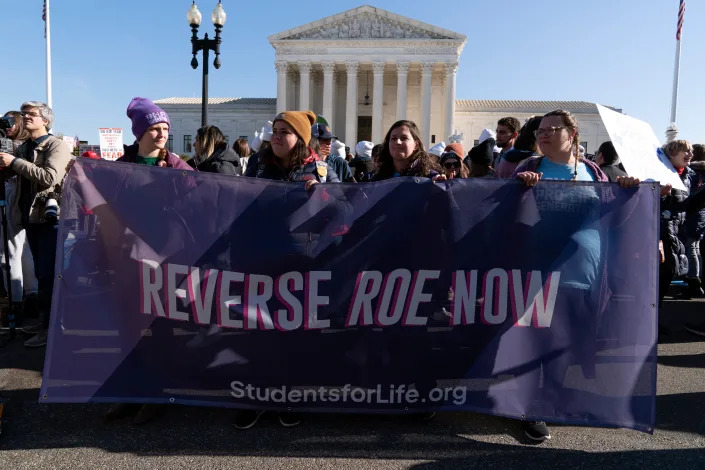USA
Student loan forgiveness is 'good policy' and 'also good politics,' Rep. Pressley says
President Joe Biden has said he's considering canceling some student loan debt for millions of Americans, and one lawmaker who played a key role in pushing him to consider debt forgiveness says that the move would make sense for several reasons.
"Democrats win when we deliver, and we have to deliver in ways that are impactful, tangible, and transformative, like canceling student debt," Congresswoman Ayanna Pressley (D-MA) said in a Yahoo Finance Presents interview (video above). "This is good policy, and it is also good politics."
Payments on federal student loans are currently paused through August 31, 2022. The pause was set to expire on May 1 after being enacted by former President Donald Trump amid the coronavirus pandemic in March 2020 and extended multiple times by Biden.
Last week, President Biden said he was considering "some debt reduction" and would make a decision in "the next couple of weeks." Biden is reportedly weighing income caps on who receives loan forgiveness.
'Next couple of weeks'
The president's change of heart on the issue is noteworthy.
Biden backed the forgiveness of $10,000 in student loan debt on the campaign trail in 2020. During his administration, prominent Democrats — including Pressley — have repeatedly urged a seemingly skeptical Biden to enact broad-based cancellation of up to $50,000 via executive action (as opposed to legislation passed by Congress).
On Thursday, he changed his tune.
"I am considering dealing with some debt reduction," Biden said during a press conference. "I am not considering $50,000 debt reduction. But I’m in the process of taking a hard look at whether or not there are going to — there will be additional debt forgiveness, and I’ll have an answer on that in the next couple of weeks."
The change of heart was welcome news for Pressley, as well as many advocates and student debtors who have been pushing for debt cancellation for years.
"I thank the President for heeding the cause of this broader movement and coalition, both to express an openness to canceling student debt at some level, and ... [for] the several pauses that we have been able to get during this pandemic," Pressley said.
'This is about the president keeping his word'
Student loans were a big topic during the 2020 general election. A recent poll by Harvard found young Americans overwhelmingly favor some form of action by the federal government on student loans while only 38% favored total debt cancellation.
"At the end of the day, we want to uplift and alleviate the burden for as many people as possible," Pressley said. "And that is why we need broad based student debt cancellation. He has the authority, and I think he has a mandate from this electorate."
The basic argument for broad cancellation, as detailed by the Legal Services Center of Harvard Law School, is that the Education Secretary has the power “to cancel existing student loan debt under a distinct statutory authority — the authority to modify existing loans found in 20 U.S.C. § 1082(a)(4).” (Toby Merrill, who founded the Project on Predatory Student Lending at Harvard Law School and co-authored the legal analysis, currently works for the Education Department.)
Pressley also stressed that student debt is also a multi-generational issue since many borrowers include parents who took out Parent PLUS loans for their children.
"This is about being responsive to the multi-generational, multiracial coalition, which decisively elected him," she stressed. "This is about the president keeping his word."
—
Aarthi is a reporter for Yahoo Finance. She can be reached at aarthi@yahoofinance.com. Follow her on Twitter @aarthiswami.
Student loan forgiveness: New analysis highlights who cancellation would help most
Student loan forgiveness would significantly help Black borrowers and reduce racial inequality, according to a new analysis by academics at UC Merced and Princeton University.
The analysis, prepared for and released by Sen. Elizabeth Warren (D-MA), showed that canceling $10,000 in student debt would zero out loan balances for two million Black borrowers, reduce the share of Black individuals with student debt, and improve Black households' net worth.
"As this analysis clearly shows, cancelling student debt is a matter of racial justice and about providing relief to millions of hardworking people who invested in their education but are now drowning in debt," Warren said in a press release. "The more President Biden cancels, the more we narrow the racial wealth gap among borrowers and the bigger the boost to Americans' economic futures. This is the right thing to do."
Prominent Democrats, including Warren, Senate Majority Leader Chuck Schumer (D-NY) and Rep. Ayanna Pressley (D-MA), have repeatedly called on Biden to cancel $50,000 in student loan debt immediately via executive order on the premise that there is sufficient legal backing for the administration to do so.
Pressley has stressed that women and people of color hold significant levels of student loan debt and that cancellation would represent a massively impactful form of relief given the disproportionate burden.
“Our new analyses show that every level of student debt cancellation will provide relief to millions of borrowers who have experienced financial distress from their student loans," stated Charlie Eaton, assistant professor of sociology at the University of California Merced and the study's primary author. "But bigger is better with higher levels of cancellation completely zeroing out debts for most of these borrowers, a disproportionate share of whom are Black and lack inherited household wealth."
Student loan forgiveness by the numbers
The analysis broke down the impact of debt cancellation of $10,000, $20,000, $30,000 and $50,000.
According to the academics, canceling $10,000 would erase the full balance of 32% of all borrowers:
$10,000 zeroes out balances for 32% of borrowers (13 million in total)
$20,000 zeroes out 50% of borrowers (20 million in total)
$30,000 zeroes out 61% of borrowers (24 million in total)
$40,000 zeroes out 71% of borrowers (28 million in total)
$50,000 zeroes out 76% of borrowers (30 million in total)
That breakdown was similar to a previous analysis of student loan data.
The $10,000 forgiveness level "reduces the share of Black individuals with student debt from 24% to 17% and closes the Black-white gap in the share of individuals with student debt from 9 percentage points to 6 percentage points," the analysis stated.
The research noted that about 66% of Black borrowers owe more than they originally borrowed 12 years are they started school, compared to 37% Latinx borrowers and 30% of white borrowers.
The study found that:
$10,000 zeroes out 14% of borrowers who owe more after 12 years.
$20,000 zeroes out 32% of borrowers who owe more after 12 years.
$30,000 zeroes out 46% of borrowers who owe more after 12 years.
$50,000 zeroes out 67% of borrowers who owe more after 12 years.
For borrowers in distress, $10,000 cancellation would zero out five million borrowers' balances — around 45% of the total number of debtors who are in default.
'The more debt we cancel, the more people we will help'
Warren's press release quoted NAACP President and CEO Derrick Johnson as saying that amid rising inflation, "the more debt we cancel, the more people we will help."
President Biden, who backed broad student loan forgiveness of $10,000 on the campaign trail in 2020 amid more generous proposals from then-rivals Sen. Bernie Sanders (D-VT) and Warren, had heretofore been reluctant to forgive debt through executive action.
Recently, however, Biden said he was "considering dealing with some debt reduction." Bloomberg reported that he was considering canceling "at least $10,000" per borrower, and the president is also reportedly considering introducing income caps to limit the benefit to certain borrowers.
—
Aarthi is a reporter for Yahoo Finance. She can be reached at aarthi@yahoofinance.com. Follow her on Twitter @aarthiswami.


.jpg)




